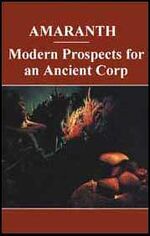Board on Science and Technology for International Development[edit | edit source]
RALPH HERBERT SMUCKLER, Dean of International Studies and Programs, Michigan State University, East Lansing, Michigan, Chairman
Members
SAMUEL P. ASPER, President, Educational Commission for Foreign Medical Graduates, Washington, D.C.
DAVID BELL, Department of Population Sciences, Harvard School of Public Health, Boston,
Massachusetts
LAWRENCE L. BOGER, President, Oklahoma State University, Stillwater, Oklahoma
ROBERT H. BURRIS, Department of Biochemistry, University of Wisconsin, Madison,
Wisconsin
CLAUDIA JEAN CARR, Conservation and Resource Studies, University of California at
Berkeley, Berkeley, California
NATE FIELDS, Director, Developing Markets, Control Data Corporation, Edina, Minnesota
ROLAND J.FUCHS, Chairman, Department of Geography, University of Hawaii at Manoa, Honolulu, Hawaii, ex officio
ELMER L.GADEN, JR., Department of Chemical Engineering, University of Virginia,
Charlottsville, Virginia
JOHN H. GIBBONS, Director, U.S. Congress, Office of Technology Assessment, Washington, D.C.
ADELAIDE CROMWELL GULLIVER, Brookline, Massachusetts N. BRUCE HANNAY, Foreign Secretary, National Academy of Engineering, ex officio
WILLIAM HUGHES, Director, Engineering Energy Laboratory, Oklahoma State University,
Stillwater, Oklahoma
WILLIAM A. W.KREBS, Vice President, Arthur D. Little, Inc., Cambridge, Massachusetts
GEORGE I.LYTHCOTT, University of Wisconsin School of Medicine, Madison, Wisconsin
JANICE E. PERLMAN, Department of City and Regional Planning, University of California at Berkeley, Berkeley, California
FREDERICK C. ROBBINS, President, Institute of Medicine, National Academy of Sciences, ex officio
WALTER A. ROSENBLITH, Foreign Secretary, National Academy of Sciences, ex officio
FREDERICK SEITZ, President Emeritus, The Rockefeller University, New York, New York, ex officio
BARBARA WEBSTER, Associate Dean, Office of Research, University of California, Davis, California
GILBERT F. WHITE, Institute of Behavioral Science, University of Colorado, Boulder, Colorado, ex officio
ALBERT WESTWOOD, Corporate Director, Research and Development, Martin-Marietta Corporation, Bethesda, Maryland
JOHN G. HURLEY, Director
MICHAEL G.C.MCDONALD DOW, Associate Director/Studies
MICHAEL P.GREENE, Associate Director/Research Grants
The National Academy of Sciences was established in 1863 by Act of Congress as a private, nonprofit, self-governing membership corporation for the furtherance of science and technology, required to advise the federal government upon request within its fields of competence. Under its corporate charter the Academy established the National Research
Council in 1916, the National Academy of Engineering in 1964, and the Institute of Medicine in 1970.
The National Research Council
The National Research Council was established by the National Academy of Sciences in
1916 to associate the broad community of science and technology with the Academy's purposes of furthering knowledge and of advising the federal government. The Council operates in accordance with general policies determined by the Academy under the authority of its congressional charter of 1863, which establishes the Academy as a private, nonprofit, self-governing membership corporation. The Council has become the principal operating agency of both the National Academy of Sciences and the National Academy of Engineering in the conduct of their services to the government, the public, and the scientific and engineering communities. It is administered jointly by both Academies and the Institute of
Medicine. The National Academy of Engineering and the Institute of Medicine were established in 1964 and 1970, respectively, under the charter of the National Academy of
Sciences.
The Office of International Affairs
The Office of International Affairs is responsible for many of the international activities of the
Academy and the Research Council. Its primary objectives are to enhance U.S. scientific cooperation with other countries; to mobilize the U.S. scientific community for technical assistance to developing nations; and to coordinate international projects throughout the institution.
The Board on Science and Technology for International Development
The Board on Science and Technology for International Development (BOSTID) of the Office of International Affairs addresses a range of issues arising from the ways in which science and technology in developing countries can stimulate and complement the complex processes of social and economic development. It oversees a broad program of bilateral workshops with scientific organizations in developing countries and conducts special studies. BOSTID's Advisory Committee on Technology Innovation publishes topical reviews of unconventional technical processes and biological resources of potential importance to developing countries.
